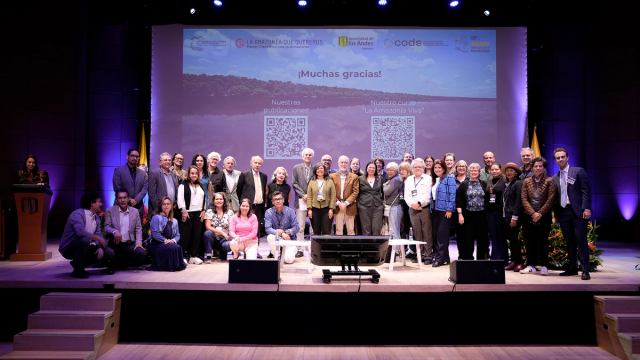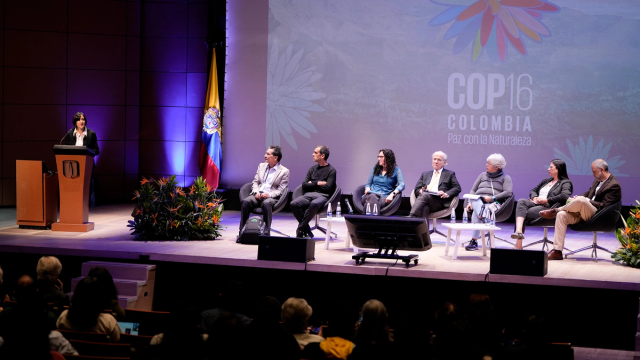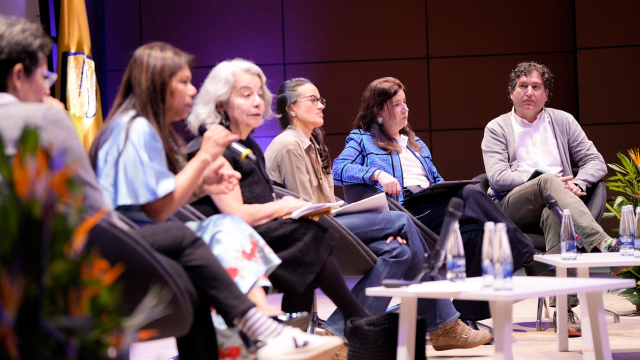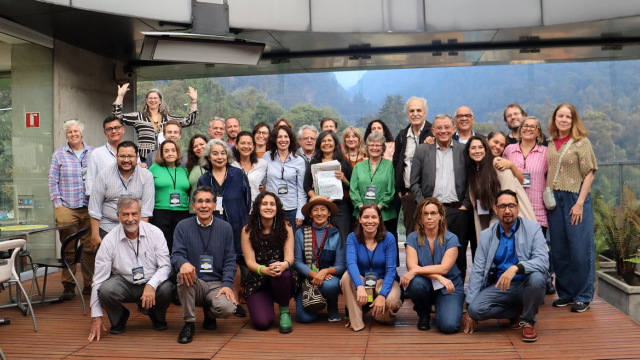The Science Panel for the Amazon Convenes in Bogotá
From April 15 to 17, 2024, the Science Panel for the Amazon (SPA) met at the Universidad de los Andes, in Bogotá, Colombia. The meeting gathered more than 40 members including from the Science Steering Committee, SPA authors, and the SPA Secretariat. The central purpose of this meeting was to set the Panel’s strategic priorities for 2024 – 2025 including for the COP16 on Biodiversity in Cali, Colombia (2024) and the COP30 on Climate Change in Belém, Brazil (2025). A key milestone will be the development of a newAmazon Assessment Report to be launched at COP30 in 2025, which will address crucial issues for the conservation and sustainable development of the region.
During the first day, the SPA members reflected on the progress and achievements of the Panel since the last meeting in March 2023, held in Brazil. Together, they used the "Vision of the Living Amazon" as a conceptual starting point for strategic planning, and analyzed the political context and opportunities in the region that the Panel should engage in on the road to COP30. Through participatory dialogues, the impacts of the SPA were reviewed and lessons were drawn that will inform future plans.
On the second day, a discussion was held on how the Panel will advance work in collaboration with Indigenous Peoples and Local Communities (IPLCs), youth, and the financial sector. In addition, collaborative work continued around the structure and priority themes of the Amazon Assessment Report 2025.
April 17, the final day of the meeting, began with a high-level event open to the public called “A Dialogue on the Amazon We Want”, bringing together leading scientists and researchers, government representatives, and Indigenous leaders to discuss zero deforestation and the development of a socio-bioeconomy to advance the transformation towards sustainable development in the Amazon. This event included the participation of the Minister of Environment and Sustainable Development of Colombia, Susana Muhamad, who highlighted the importance of dialogues of science and Indigenous knowledge to inform public policies. She called for the development of bioeconomic alternatives based on the ecological and cultural cycles of the Amazon. She also advocated for effective regional articulation to address the challenges of the biome, recognizing the need for strong, science-based international cooperation Minister Muhamad proposed an agenda that links biodiversity and climate change: addressing biodiversity conservation and restoration as key in climate action, with emphasis on the participation of local and Indigenous communities. She stressed the importance of placing human rights at the center of conservation efforts. Peace with nature is the main message of the Colombia Presidency of COP16.
This public event included two important panel discussions. The first focused on issues of deforestation and degradation in the Amazon, to identify priority areas and possible scientific contributions of the SPA to achieve zero deforestation by 2030. This dialogue was moderated by Manuel Rodríguez-Becerra (Universidad de los Andes), and included interventions by leading experts in the field: Maria Soledad Hernández Gomez (SINCHI Institute), Omar Franco Torres (Como Vamos National Parks), Dolors Armenteras (Universidad Nacional de Colombia), Carlos Rodríguez (Tropenbos), Carlos Daniel Cadena Ordoñez (Universidad de los Andes) and Alejandra Laina (WRI Colombia). This panel made clear the need to strengthen local governance of the Amazon and to reach international agreements to stop its deforestation.
The second panel was moderated by Emma Torres, SPA Strategic Coordinator, and addressed the socio-bioeconomy of healthy standing forests and flowing rivers in the Amazon. This conversation included the participation of Fany Kuiru Castro (COICA), Hernando García Martínez (Alexander von Humboldt Institute), Sandra Valenzuela de Narvaez (WWF Colombia), Mariana Gómez Soto (Gaia Foundation) and Carolina Gil (Amazon Conservation Team). The discussion highlighted that there are many “Amazons” that are part of this territory and that consequently, the development of socio-bioeconomies should be informed by those diverse realities. The panel emphasized the importance of Indigenous economies and traditional knowledge to foster long-term sustainability. The Panel also highlighted the importance of increasing investment in science, technology, and innovation in the Amazon region.
On the afternoon of the third day, the SPA discussed its strategy for COP16 and COP 30. Also, a dialogue occurred on the internal functioning of the Panel, including issues of membership, communications, and youth engagement. In this way, three intense days of work were closed, leaving participants inspired to continue building a sustainable future for the Amazon.
The workshop in Bogotá provided an initial scope and structure of the Amazon Assessment Report 2025 and a vision of the path towards COP16 and COP30. In addition, strategies for the involvement of key actors such as youth, IPLCs, and the financial sector were further advanced, as were the communication actions that will be essential to help achieve The Amazon We Want.



